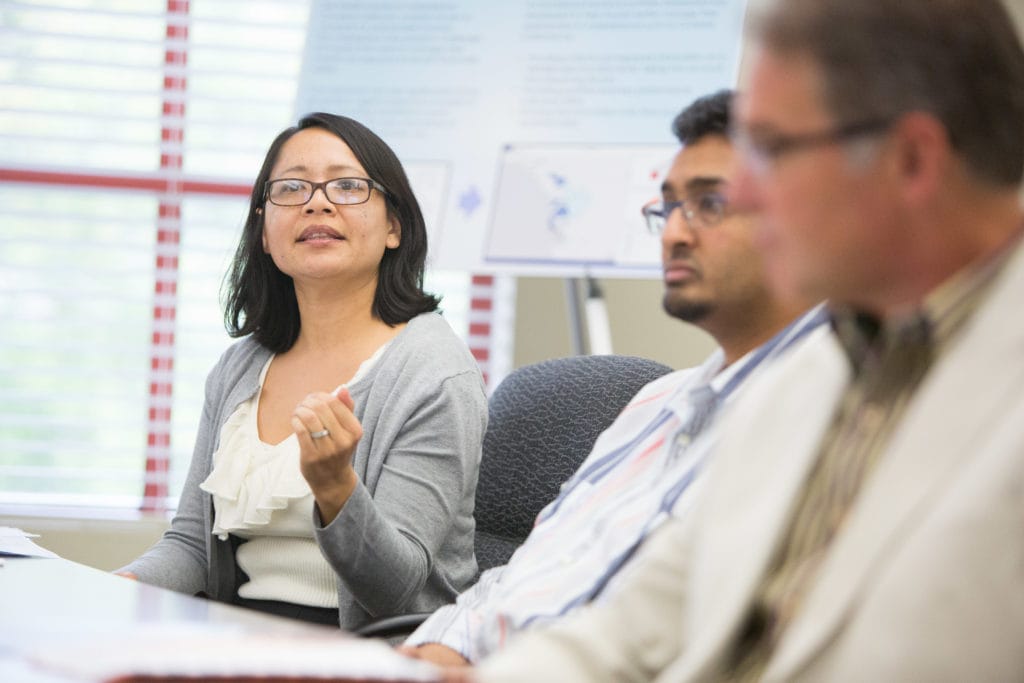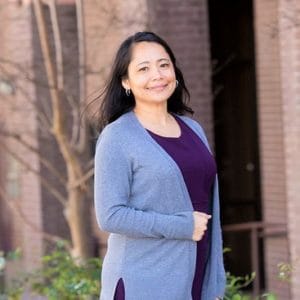Turning a Grim Diagnosis into Hope for Herself and Others

CGU Alumna April Moreno hasn’t let an autoimmune diagnosis stand in her way of completing her graduate education—and trying to help others in similar situations
###
NELSON MANDELA ONCE SAID that over the many trials and challenges he faced in his lifetime, he learned that courage was not the absence of fear, but the triumph over it.
For April Moreno (PhD, Health Promotion Sciences/Information Systems and Technology, ’17), that same sentiment was put to the test when she was working toward a doctorate in her third year at CGU. It was then that Moreno developed an autoimmune disorder that radically changed her life and, over time, altered the direction she would take in her career.
Autoimmune disorders occur when the body’s defenses attack healthy tissues by mistake; the term refers to a wide range of conditions, ranging from psoriasis and rheumatoid arthritis to lupus, multiple sclerosis, and more.
Against great physical odds (at one point she even temporarily lost her sight), Moreno persevered and earned her doctorate on time in 2017. She was in the last cohort of the Claremont National Scholars in 2013, and was the first interfield graduate in the School of Community and Global Health and the Center for Information Systems and Technology.
Today, she has drawn on her experiences with autoimmune disease to establish the Autoimmune Community Institute, a nonprofit research, advocacy, and support organization for autoimmune health equity. Moreno is the organization’s founder and executive director.
(For more, visit www.ACICommunity.org)
“It answers a real need that people with chronic illness have,” Moreno said. “Whether we’re in a pandemic or not, people with autoimmune conditions need guidance to keep everything in check. I hope this institute will provide the right kind of help.”
Scared But Determined
Moreno’s chronic illness diagnosis came after she quit a stressful job (she was working while also preparing for her doctoral dissertation) and had a debilitating panic attack on a plane that eventually led to myriad problems with her physical health.
“It was this whole journey,” she says. “I had quit the job but I was just beginning to get sick. It was several months of strange stuff going through my body. For me, the main thing was getting my mental health under control.”
Moreno says that in the early days of her disorder she didn’t know if she would survive. Her specialist told her that it could make life difficult, and that for some people with the illness, they would withdraw from life entirely.
That, Moreno said, shocked her and made her think deeply about her diagnosis: It also made her more guarded in discussing it with strangers.
“The autoimmune diagnosis had a lot of stigma behind it,” she says, “so I don’t like to share the diagnosis with people outside the autoimmune community. I was advised to do that by my specialist.”
In the early months after her diagnosis, she struggled to navigate her condition and said it never occurred to her to contact the disabilities office about it.
“I was relapsing for several months and it affected all parts of my body with fatigue, numbness, all kinds of stuff,” she said, “and I didn’t realize I even had a disability yet. I thought, ‘Maybe this is temporary.’ I didn’t even know it would be considered a disability until maybe a year after the onset.”

Graduate Journey and Challenges
While she battled the symptoms, one thought began to crystallize in Moreno’s mind.
“If I’m gonna die from this, I want to graduate and finish,” she says. “That was my major motivation at the time. It became my #1 goal.”
And graduate she did with her thesis: Health Informatics and Geo-Analytics for Improving Health Outcomes: Data Quality, Interoperability, and Spatial Methods.
Like other people who have dealt with life-altering challenges by meeting those challenges head-on, Moreno has become an advocate for the autoimmune community via her weekly podcast for women with autoimmune disorders called “The Sisterhood of Limitless Living” (www.doctoraprilwellness.podbean.com) and the nonprofit research institute that she founded earlier this year.
On her podcast, Moreno has interviewed many of the leading lights conducting research on autoimmune diseases including Dr. Noel Rose (an American immunologist, pathologist, and molecular microbiologist widely known for pioneering autoimmunity during the 1950s), as well as people diagnosed with lupus, mulltiple sclerosis and primary sclerosing cholangitis (PSC), a chronic liver disease.
According to the National Institutes of Health, up to 23.5 million Americans (more than seven percent of the population) suffer from an autoimmune disease—and the prevalence is rising.
“They are people with all different types of autoimmune diseases (more than 80 have been listed) who’ve taken their lives under control and have a healthy perspective, a healthy approach to living with their autoimmune condition,” Moreno says.
Ahead of the Curve
According to Moreno, with the coronavirus pandemic bringing life to a virtual standstill for many, people with autoimmune disorders are way ahead of the curve in taking social distancing and quarantine in stride.
“In the autoimmune community some of us joke that people now have to work from home and stay home, but many of us do it every day. We are part of that vulnerable population. I don’t know the specifics of what is happening with every autoimmune disease, but you can imagine if it’s affecting your lungs or organs that that is a concern. Also, many of us, including me, are on immune suppressing medications.”
Five years ago, not knowing if she would survive her autoimmune condition, Moreno was dedicated to completing her doctorate and making every day matter; learning how to navigate disability and come to terms with chronic illness. Now she looks forward to building on the podcast and her institute.
“I think there’s an emerging need in terms of autoimmune awareness, but then there is also that equity piece — making sure that the voices and experiences of people with diverse diagnoses are describing their experiences – that they have a platform.”
For Moreno, a grim diagnosis led to a hopeful prognosis for her and the community she serves.